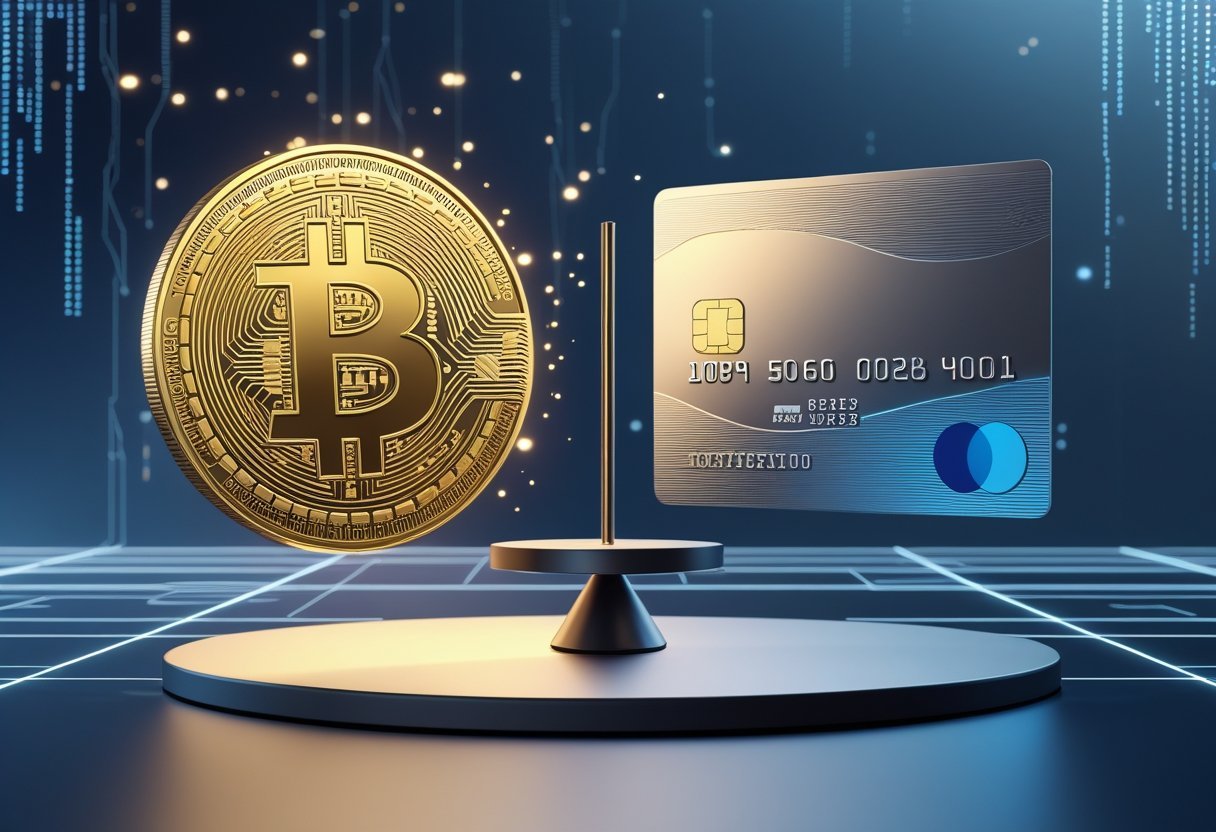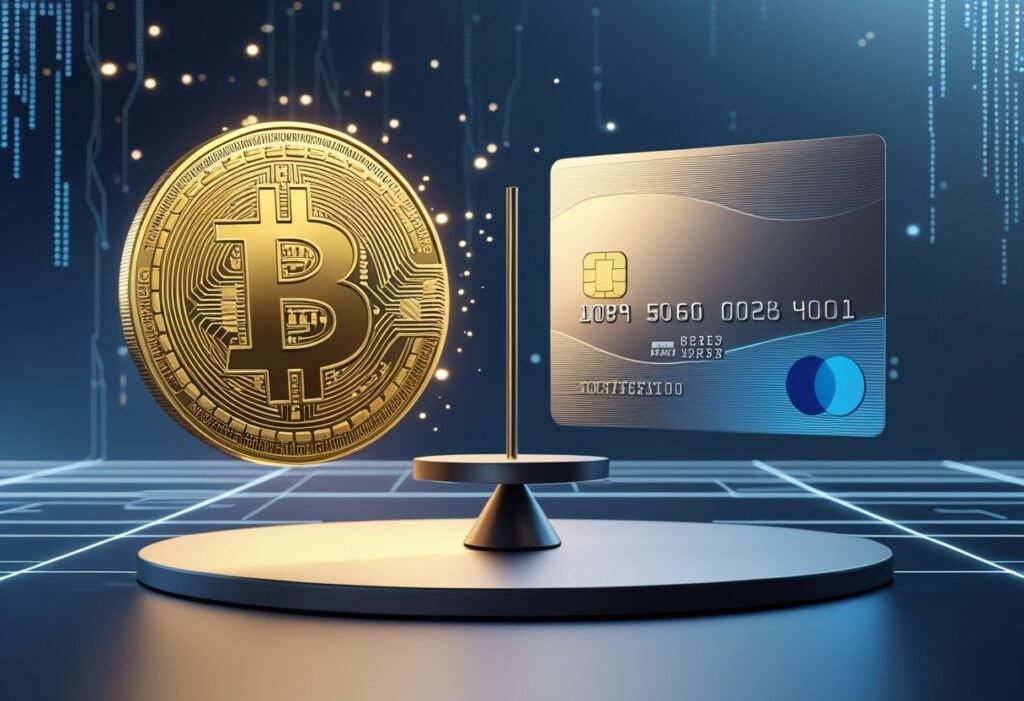People often wonder which payment method is better: Bitcoin or credit cards. Both have unique features that suit different needs. Bitcoin offers lower fees, faster cross-border payments, and no charge-backs, making it valuable for merchants and users looking for efficiency and security.

Credit cards remain popular because they are widely accepted and offer consumer protections like dispute resolution and refunds. However, credit card transactions often come with higher fees and slower settlements, especially with international payments.
Understanding these key differences helps individuals and businesses decide which payment system fits their goals best. This comparison looks closely at speed, cost, and security to guide that choice. For more details, see Bitcoin vs. credit card transactions: a comparative analysis.
Key Differences Between Bitcoin and Credit Cards
Bitcoin and credit cards differ in how they operate, how much they cost to use, how fast payments happen, and the level of privacy and security they offer. These differences affect how people choose to pay for goods and services.
Decentralization and Centralization
Bitcoin is a decentralized payment method. It runs on blockchain technology, which means no central authority controls it. Transactions are recorded on a public ledger visible to anyone, ensuring transparency but removing middlemen like banks.
Credit cards, on the other hand, depend on centralized systems managed by banks and payment processors. These institutions handle transaction approval, dispute resolution, and fraud protection. Centralized control means users rely on these parties to process payments and protect their data.
This fundamental difference impacts who holds power in each system. Bitcoin gives users more control over their funds, while credit cards depend heavily on the trustworthiness of financial institutions.
Transaction Fees and Costs
Bitcoin transaction fees vary but generally depend on network demand. These fees pay miners who confirm transactions on the blockchain. Sometimes fees can be high during peaks, but there are no fixed rates.
Credit card transactions include fees charged by banks and card networks. Merchants often pay percentage-based fees plus flat rates per transaction. These costs are usually higher and can affect product prices indirectly.
Users may face additional fees with credit cards, such as interest charges or foreign transaction fees. Bitcoin fees tend to be transparent, but fluctuating network costs can surprise users during busy times.
| Aspect | Bitcoin | Credit Cards |
|---|---|---|
| Fee Type | Network fee (variable) | Merchant fees + possible interest |
| Fee Amount | Varies with network traffic | Usually fixed % + flat rate |
| Fee Transparency | Clear on blockchain | Often hidden in merchant fees |
Payment Processing and Transaction Speed
Bitcoin transactions need confirmation by miners, which can take from a few minutes to over an hour depending on network congestion. Once confirmed, a Bitcoin payment is final and irreversible.
Credit card transactions are usually processed instantly or in a few seconds at point of sale. They can be reversed or disputed within days if fraud or errors occur, giving users more flexibility.
This speed and reversibility make credit cards convenient for everyday purchases, while Bitcoin’s slower and irreversible payments suit those who prioritize security and control over instant processing.
Anonymity, Privacy, and Security Features
Bitcoin offers more privacy than credit cards because users aren’t directly identified on the blockchain. Transactions link to wallet addresses, not personal data, helping protect identity but still allowing transaction history tracking.
Credit cards store sensitive personal information with financial institutions. This centralization raises risks like identity theft and data breaches if systems are hacked. However, these institutions also provide fraud protection and dispute mechanisms.
Blockchain security relies on cryptography, making Bitcoin transactions very difficult to alter. Credit card systems depend on secure networks and encryption but face ongoing threats from hackers targeting stored data.
Users who value privacy and decentralized control often prefer Bitcoin. Those seeking insurance and regulated protections usually lean toward credit cards.
For more details on these differences, see the analysis at Bitcoin vs. credit card transactions: A Comparative Analysis.
Practical Considerations and Real-World Use
Choosing between bitcoin payments and credit card transactions depends on factors like where payments are accepted, how disputes are handled, and how well each option works for international payments. These points shape convenience and cost for users and merchants alike.
Merchant Acceptance and Integration
Credit cards like Visa and Mastercard are accepted by millions of merchants worldwide, including most e-commerce sites. Payment processors and gateways simplify integration, allowing businesses to quickly add credit card options. Merchants benefit from established networks and customer trust but often face higher fees and longer payment settlement times.
Bitcoin payments, while growing, are less widely accepted but expanding through digital wallets and specialized payment gateways. Merchants need to set up a bitcoin wallet and may use the Bitcoin Lightning Network to speed up transactions and lower fees. The decentralized nature of crypto means merchants handle their own transaction processing without banks or financial institutions. However, complexity and volatility in digital assets limit mass adoption in everyday retail.
| Feature | Credit Card | Bitcoin |
|---|---|---|
| Acceptance | Widely accepted | Limited but growing |
| Fees | Higher, includes processor | Lower, network fees vary |
| Settlement time | Hours to days | Seconds to minutes with Lightning Network |
| Integration | Easy with gateways | Requires wallet setup |
Chargebacks, Disputes, and Fraud Protection
Credit cards offer strong fraud protection through payment processors and banks. If a dispute arises, customers can request a chargeback, where the transaction is reversed. This protects buyers but creates risk and cost for merchants due to possible fraudulent claims.
Bitcoin payments are irreversible because transactions are recorded on a transparent blockchain. This means no chargebacks or disputes can be processed through a payment network. While this lowers fraud risk for merchants, consumers cannot reclaim funds without merchant consent. Smart contracts on platforms like Ethereum can add some dispute resolution features, but these are not common for everyday bitcoin transactions.
Strong ownership and transparency of digital assets ensure visible transaction history, but users must be careful to avoid phishing and wallet theft since security relies heavily on user control of private keys.
International Payments and Cross-Border Transactions
Credit card transactions for international payments typically involve currency conversion fees and higher charges from payment processors. Processing time can also increase due to additional layers in financial institutions and compliance checks.
Bitcoin payments reduce costs and processing time because they do not rely on banks or intermediaries. Cryptocurrency moves peer-to-peer, enabling near-instant international transactions with low fees using the Bitcoin Lightning Network. This advantage is especially clear for cross-border e-commerce and remittances where credit card fees and exchange rates add significant expense.
Nevertheless, fluctuating cryptocurrency prices and regulatory uncertainties may affect user confidence and acceptance. Merchants who accept bitcoin often convert it immediately to local currency to avoid volatility in digital assets.

